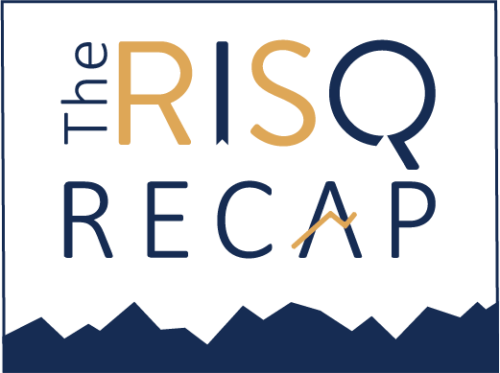
Each week, you’ll find specially curated news articles to keep you up to date on the ever-evolving world of insurance and risk management. The articles are divided out between items relevant to Property & Casualty, Employee Benefits/Human Resources, and Compliance. We’ve included brief summaries of each item as well as a link to the original articles.

PROPERTY & CASUALTY
Damage Assessments Begin in Flooded Alaska Villages
“Authorities in Alaska were making contact this week with some of the most remote villages in the United States to determine their food and water needs, as well as assess the damage after a massive storm flooded communities on the state’s vast western coast this weekend. No one was reported injured or killed during the massive storm – the remnants of Typhoon Merbok – as it traveled north through the Bering Strait over the weekend. However, damage to homes, roads and other infrastructure is only starting to be revealed as floodwaters recede.” Full Article
– Insurance Journal

EMPLOYEE BENEFITS, HUMAN RESOURCES, & COMPLIANCE
Wage and Hour Concerns for Employers of Remote Workers “Employers who allow workers to work remotely, or on a hybrid work schedule, could face challenges related to wage and hour compliance issues under the Fair Labor Standards Act (FLSA). Hourly workers who are not exempt from the FLSA overtime rules, which have no set or enforced policies on where and when they can work, could create major liability for employers under certain circumstances. While there is no way to eliminate the risk of FLSA violations with remote and hybrid workers, employers can take some steps to minimize their risk of lawsuits by employees and enforcement actions by regulatory agencies.” Full Article – Hall Benefits Law LLC
Born Under a Bad Sign: Avoiding Electronic Signature Blues “When Albert King sang “Born Under a Bad Sign,” he was not referring to a document containing an invalid electronic signature. Nevertheless, in a post-COVID world with large numbers of remote workers, employers can take affirmative steps to minimize the kind of “bad luck” the blues singer referred to by understanding issues that may arise when using electronic signatures. Laws at both the state and federal level generally allow electronic signatures to have the same validity as their traditional handwritten counterparts. In an employment context, these laws can cover a wide range of documents, from contracts, to settlement agreements, to restrictive covenant agreements, and more.” Full Article – Akerman LLP
Saving the Employment Relationship “Quiet quitting continues to dominate the headlines. Today’s report in the Wall Street Journal features a Gallup study that suggests nearly half of American workers are “psychologically detached” from their jobs. This study (if true) is troubling for the future of the employment relationship if indifference forms the foundation of that relationship. Indifference can only thrive in a workplace lacking a well-articulated mission the employees believe in. And the feeling of detachment — that someone can phone it in, do the bare minimum, and disown the results — is more likely to exist when an employee senses professional or personal disinterest. So how can the employment relationship be saved in this environment?” Full Article – Mintz
Internship Laws in Review: Ensuring Your Next Internship Program Does Not Run Afoul of State and Federal Labor Laws “As internship season ends, now is a perfect time for employers to review their internship programs to ensure compliance with federal, state and local labor and employment laws. Internships are generally intended to be educational opportunities for students or recent graduates to learn invaluable on-the-job skills, how to effectively work in a specific environment and perhaps earn academic credit or supplement their education post-graduation. Depending on the purpose of the program and a variety of other factors, the internship may be paid or unpaid. In most cases, interns will be considered employees subject to minimum wage and overtime pay, as well as other “employment” obligations such as Workers Compensation, and Unemployment Insurance and federal and state tax withholding.” Full Article – Venable LLP
Resurgence in Criminal Prosecutions for OSHA Workplace Safety Violations – Spencer Fane LLP
“A series of recent criminal prosecutions stemming from workplace fatalities in connection with OSHA’s worker safety laws underscore the Justice Department’s willingness to charge OSH Act crimes, even in the absence of other Title 18 offenses or other criminal charges.” Full Article
NLRB Proposes Return to a More Expansive Joint Employer Standard “One day after Labor Day, the National Labor Relations Board (“NLRB” or the “Board”) issued a proposed rule that would rescind and replace the Trump Administration’s 2020 rule that established the current test for determining whether two entities are joint employers. Predictably, the proposed rule, if adopted by the Board, will result in more findings that two entities are joint employers. Under federal labor law, a joint employer is required to bargain with a union selected by its jointly-employed workers and may be held liable for the unfair labor practices committed by the other employer.” Full Article – Shawe Rosenthal LLP

STATE & INTERNATIONAL COMPLIANCE
In addition to the RISQ Review, RISQ Consulting also provides a resource that features changes and updates to State and International Compliance measures. We’ve included brief summaries of each item below, and also provided links to the original articles if you’d like to read further.
NEW JERSEY
Changes to Posting Requirements Prompt Jersey Employers to Ensure Compliance
“The New Jersey Division on Civil Rights (DCR) recently published final regulations that change the content of certain required notifications New Jersey employers must provide to employees. On August 1, 2022, the DCR announced that these changes are effective immediately and are intended to better inform individuals of their rights under the New Jersey Law Against Discrimination (LAD) and the New Jersey Family Leave Act (FLA). Regulations under the LAD and FLA require covered employers to (1) “display” the official posters in “easily visible” places and (2) “provide” each employee with a copy of the official posters annually and upon an employee’s first request.” Full Article
– Duane Morris LLP
OREGON
Rules Governing Oregon’s New Paid Family and Medical Leave Insurance Program and Equivalent Plan Application Process
“On July 22, 2022 and August 22, 2022, the Oregon Employment Department (OED) published its latest rules governing Oregon’s new Paid Family and Medical Leave Insurance (PFMLI) program. The PFMLI program will be funded by employer and employee contributions in the form of payroll deductions beginning January 1, 2023 and will provide employees with up to 12 weeks of paid time off for leave that qualifies as family, medical, or safe leave, absent undue hardship, beginning on September 3, 2023.” Full Article
– Littler Mendelson PC
MICHIGAN
The Michigan Supreme Court Holds that Discrimination on the Basis of Sexual Orientation is Prohibited by the Elliott-Larsen Civil Rights Act
“On July 28, 2022, in a 5-2 opinion, the Michigan Supreme Court held that the prohibition of discrimination “because of… sex” in the Elliott-Larsen Civil Rights Act (“ELCRA”) includes discrimination on the basis of sexual orientation. Rouch World LLC v Department of Civil Rights, No. 162482, July 28, 2022.” Full Article
– Dickinson Wright
MISSISSIPPI
Protections for Employers Under the New
“Mississippi Medical Cannabis Act that was signed by Gov. Tate Reeves in February 2022 was written in a way to protect employers. Here are some protections that employers will see under the new law. Some of the protections offered are; employers are not required to pay for or reimburse any individual or entity for cost associated with the medical use of cannabis, no employer is required to permit or accommodate the medical use of cannabis and employers are not prohibited from hiring or discharging the privilege employment because of an individual’s use of medical cannabis.” Full Article
– Phelps Dunbar LLP
CALIFORNIA
California Creates Unelected Council to Set Minimum Wages/ Working Conditions of 500,000 Fast Food Workers
“On September 5, 2022, Governor Gavin Newsom signed the Fast Food Accountability and Standards Recovery Act or FAST Recovery Act (AB-257). The state government, which is dominated at all levels by union-friendly politicians, will appoint a 10-member Council composed of employees, employers and “union activists” to set the minimum wages and working conditions of fast food workers in the state – however, the new Council will only have jurisdiction over non-unionized fast food restaurants. Since unionized restaurants will be exempted from the law, they will be free to pay their employees lower wages and benefits than those set by the Council.” Full Article
– Proskauer Rose LLP





 Subscribe to the RISQ Recap, a weekly post to help you stay up to date on news articles and resources for your organization’s compliance needs.
Subscribe to the RISQ Recap, a weekly post to help you stay up to date on news articles and resources for your organization’s compliance needs.